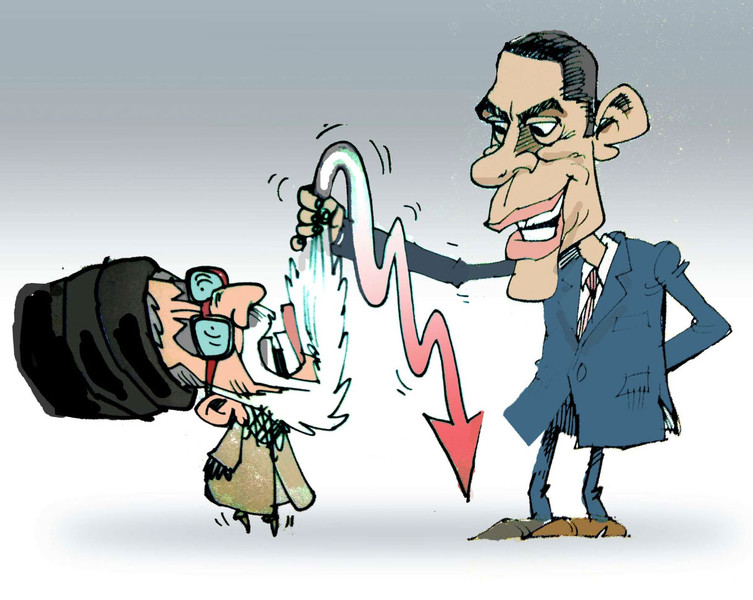Iran Feature: Stumbling and Stalemate over Sanctions (Mills)b
Nikahang Kowsar on the Supreme Leader, President Obama, and US-led Sanctions
On Saturday, President Obama signed a Defense Authorization bill which includes the possibility of increased sanctions against Tehran, notably against foreign companies who maintain links with Iran's Central Bank. At the end of January, the European Union will again consider the cut-off of oil imports from Iran.
Writing for Foreign Policy on 23 December, Robin Mills reviewed the situation and argued that this is a "stalemate" marked by politics, rhetoric, and no small measure of ineptitude:
As the country that gave the world chess, it is only appropriate that Iran's current sanctions standoff with the United States resembles a game between two inept players. Tehran repeatedly makes bad moves; Washington plays better but has no path to checkmate.
Events this week gave encouragement that steadily tightening Western oil sanctions on Iran, imposed over its alleged nuclear weapons program, were having an effect.
Britain and France are working on a European Union-wide ban on importing oil from Iran, while an amendment to the 2012 U.S. defense authorization bill would try to close down transactions with Iran's Central Bank. China's leading refiner, Sinopec, halved its January purchases of Iranian crude on a dispute over credit terms, while Saudi supplies surged by a third. This is exactly the intention of the amendment: to narrow the circle of Iran's customers to China and a few others, giving them the ability to extract discounts and thus starving the Islamic Republic of revenue.
This follows the stunning effectiveness of sanctions on Syria, where oil exports have fallen almost to nothing, and Shell, Total and other Western operators have withdrawn. (Of course, this has not stopped the killing, and Syria is but a bit player in global oil markets.)
Iran's response was surprisingly panic-stricken. It's hardly as if the tightening of sanctions has come as a surprise -- they have been in the works for months, and the Islamic Republic has lived under some kind of oil sanctions ever since its birth 30 years ago.
One sign of panic is Iran's escalating rhetoric about the energy reserves it shares with its neighbors. In November, Iran oil minister Rostam Ghassemi, a Sepah (Revolutionary Guards) commander, announced that development of the "shared fields" would be accelerated. Then, on Dec. 22, the spokesman for the majlis's energy committee, Emad Hosseini, said that Arab countries were cooperating to steal oil and gas from fields that cross into Iranian territory. He specifically accused Qatar, with whom Iran shares the world's largest gas field, Kuwait, and Saudi Arabia. Iraq's coveted Block 9 on the Iranian frontier, to be auctioned in March, is another spot to watch, after Iran occupied a border oil well in 2009. The issue of the shared fields has surfaced episodically for years, but highlighting it now in inflammatory terms puts pressure on Iran's Arab neighbors.
On the same day as Hosseini's comments, a Revolutionary Guards admiral announced a war game in the Strait of Hormuz, through which some 40 percent of international oil trade passes. Blocking Hormuz is widely seen as a possible Iranian response to further sanctions or military attacks -- but in practice the United States could probably quickly reopen the waterway, and would be supported by Europe, India, China and every other major oil importer. (It's also worth noting that virtually all of Iran's own exports go through the strait.)
On Dec. 20, semi-official news agency Mehr News announced that Iran had blocked imports from the UAE, with which it did $15 billion in trade in 2011, to punish it for supporting U.S. sanctions. The Iranian foreign minister quickly backed away from this suggestion, but the damage was done: The Iranian riyal plunged by 10 percent against the dollar as traders hurried to offload the currency, and has now lost half its value in the past few months.

 Monday, January 2, 2012 at 8:38
Monday, January 2, 2012 at 8:38
Reader Comments